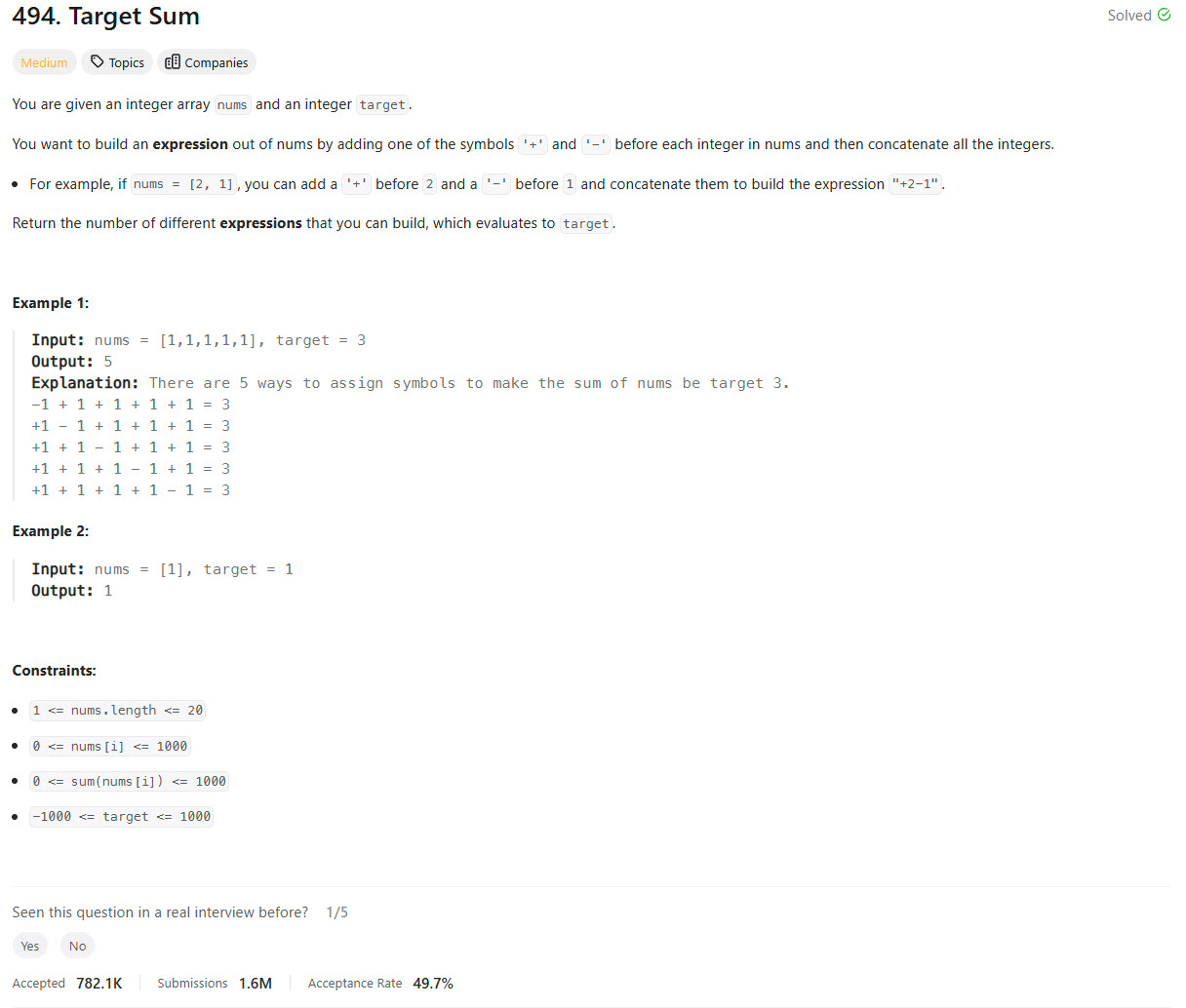Problem of The Day: Target Sum
Problem Statement

Intuition
The problem requires finding the number of ways to assign + and - signs to elements in the array such that their sum equals a given target. At first glance, this can be visualized as a tree of decisions, where each node represents a choice: adding or subtracting the current number.
Approach
The solution uses a Depth First Search (DFS) approach with memoization. Here’s how it works:
-
Recursive Decision Tree:
- For each number in the array, you can either add it or subtract it from the current sum.
- This creates a binary tree where each node represents a partial sum.
-
Base Case:
- When all numbers have been processed (i.e., the
indexequals the length of the array), check if the current sum equals the target. If it does, this is a valid solution.
- When all numbers have been processed (i.e., the
-
Memoization:
- To optimize the solution and avoid recalculating results for the same state, store the results of previously computed states in a dictionary (
memo). - A state is uniquely identified by the
indexand thecurr_sum.
- To optimize the solution and avoid recalculating results for the same state, store the results of previously computed states in a dictionary (
-
Recursive Calculation:
- At each recursive call, calculate the number of ways for both adding and subtracting the current number.
- Sum these results and store them in the
memofor reuse.
Complexity
-
Time complexity: \(O(n \cdot S)\)
where (n) is the number of elements in the array, and (S) is the range of possible sums. Memoization ensures each state is computed only once. -
Space complexity: \(O(n \cdot S)\)
for the memoization dictionary and the recursion stack.
Code
class Solution:
def findTargetSumWays(self, nums: List[int], target: int) -> int:
def dfs(index, curr_sum, memo):
if index == len(nums):
return curr_sum == target
if (index, curr_sum) in memo:
return memo[(index, curr_sum)]
positive = dfs(index + 1, curr_sum + nums[index], memo)
negative = dfs(index + 1, curr_sum - nums[index], memo)
memo[(index, curr_sum)] = positive + negative
return memo[(index, curr_sum)]
memo = defaultdict(int)
return dfs(0, 0, memo)
Editorial
Approach 2: Recursion with Memoization
class Solution:
def findTargetSumWays(self, nums: List[int], target: int) -> int:
self.total_sum = sum(nums)
memo = [
[float("-inf")] * (2 * self.total_sum + 1) for _ in range(len(nums))
]
return self.calculate_ways(nums, 0, 0, target, memo)
def calculate_ways(
self,
nums: List[int],
current_index: int,
current_sum: int,
target: int,
memo: List[List[int]],
) -> int:
if current_index == len(nums):
# Check if the current sum matches the target
return 1 if current_sum == target else 0
else:
# Check if the result is already computed
if memo[current_index][current_sum + self.total_sum] != float(
"-inf"
):
return memo[current_index][current_sum + self.total_sum]
# Calculate ways by adding the current number
add = self.calculate_ways(
nums,
current_index + 1,
current_sum + nums[current_index],
target,
memo,
)
# Calculate ways by subtracting the current number
subtract = self.calculate_ways(
nums,
current_index + 1,
current_sum - nums[current_index],
target,
memo,
)
# Store the result in memoization table
memo[current_index][current_sum + self.total_sum] = add + subtract
return memo[current_index][current_sum + self.total_sum]
Approach 3: 2D Dynamic Programming
class Solution:
def findTargetSumWays(self, nums: List[int], target: int) -> int:
total_sum = sum(nums)
dp = [[0] * (2 * total_sum + 1) for _ in range(len(nums))]
# Initialize the first row of the DP table
dp[0][nums[0] + total_sum] = 1
dp[0][-nums[0] + total_sum] += 1
# Fill the DP table
for index in range(1, len(nums)):
for sum_val in range(-total_sum, total_sum + 1):
if dp[index - 1][sum_val + total_sum] > 0:
dp[index][sum_val + nums[index] + total_sum] += dp[
index - 1
][sum_val + total_sum]
dp[index][sum_val - nums[index] + total_sum] += dp[
index - 1
][sum_val + total_sum]
# Return the result if the target is within the valid range
return (
0
if abs(target) > total_sum
else dp[len(nums) - 1][target + total_sum]
)
Approach 4: Space Optimized
class Solution:
def findTargetSumWays(self, nums: List[int], target: int) -> int:
total_sum = sum(nums)
dp = [0] * (2 * total_sum + 1)
# Initialize the first row of the DP table
dp[nums[0] + total_sum] = 1 # Adding nums[0]
dp[-nums[0] + total_sum] += 1 # Subtracting nums[0]
# Fill the DP table
for index in range(1, len(nums)):
next_dp = [0] * (2 * total_sum + 1)
for sum_val in range(-total_sum, total_sum + 1):
if dp[sum_val + total_sum] > 0:
next_dp[sum_val + nums[index] + total_sum] += dp[
sum_val + total_sum
]
next_dp[sum_val - nums[index] + total_sum] += dp[
sum_val + total_sum
]
dp = next_dp
# Return the result if the target is within the valid range
return 0 if abs(target) > total_sum else dp[target + total_sum]